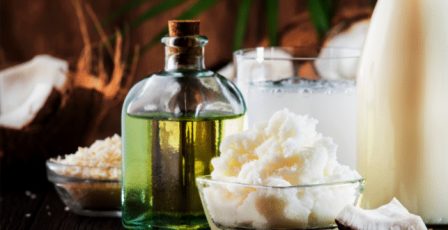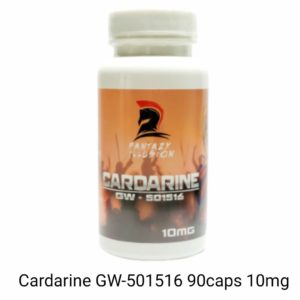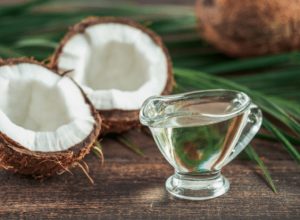
Coconut oil vs. MCT oil – which is better for you?
Coconut oil vs. MCT oil – which is better for you?
Coconut oil has even become trendy because of its useful composition and beneficial effects on the body. It can be found in every health food section, even in popular grocery stores. It is also widely used in cosmetics for hair and skin. In athletes, MCT oil is more popular, present in large quantities in coconut oil, but not only. It can also be obtained from palm oil or found in dairy products – cheese, natural yogurt. Suppose someone cares about obtaining the maximum amount of fatty acids with valuable properties. In that case, it is not enough to use only coconut oil. A real boost of energy is MCT fats, but there are only a few tens of percent in coconut oil. It is worth learning a little more about both of these products, as they differ in many ways.

Coconut oil vs. MCT oil
Many people reach for coconut oil precisely because of the MCT fats it contains. They can also be isolated and be in the form of MCT oil. The first difference can already be seen in the fatty acid chain’s length, more precisely in the lower number of carbon atoms. This means that no enzymes are required for the digestion of MCT oil, and absorption occurs without bile acids. It can be said that the fatty acids in MCTs go directly to the liver, where they are rapidly digested and absorbed. They can be used as a source of energy for immediate use or converted into ketone bodies. People on a low-fat diet or in a state of ketosis use MCTs for energy – they replace glucose. You do not have to worry about gaining weight due to your diet’s high amount of fat. MCT oil is used for energy production on an ongoing basis and additionally supports the weight loss process. Therefore, it can be said that it promotes weight loss and maintaining a slim figure.
Many similarities and even more differences
Coconut oil and MCT oil are similar in many ways, but at the same time, there are quite a few differences. If someone is looking for a 100% source of MCT fatty acids, they should go for MCT oil, a concentrated source of MCTs. It is extracted from coconut or palm oil through a refining process. It no longer contains any of the other compounds that are present in raw coconut oil. MCT fatty acids are assumed to make up about 60% of coconut oil. It is produced from the pulp of the coconut palm nut. There is a big difference between the two oils about caprylic acid content – in MCT oil, it is 50 to 80%.

 In contrast, in coconut oil, it is only 7%. MCT oil has 20-50% caprylic acid in its composition, while coconut oil has only 5%. Caprylic acid has eight carbon atoms, caproic acid six, capric acid ten, and lauric acid twelve. There is no lauric acid in MCT oil, but there is 42% in coconut oil. It is therefore not possible to speak of the same effect as MCT oil.
In contrast, in coconut oil, it is only 7%. MCT oil has 20-50% caprylic acid in its composition, while coconut oil has only 5%. Caprylic acid has eight carbon atoms, caproic acid six, capric acid ten, and lauric acid twelve. There is no lauric acid in MCT oil, but there is 42% in coconut oil. It is therefore not possible to speak of the same effect as MCT oil.
It is characteristic of MCT oil that it is absorbed almost entirely through the portal vein since it consists almost entirely of medium-chain fatty acids. Since coconut oil is dominated by lauric acid, there is considerably less absorption in the same way. Long-chain fatty acids are absorbed primarily through the lymphatic vessels. Another difference concerns the effect on cholesterol levels. MCT oil does not precisely increase the LDL fraction because it is transported via the portal vein. In contrast, consumption of coconut oil contributes to an increase in blood cholesterol levels. The differences between the two oils also relate to how they are metabolized in the body.
 What else is worth knowing about coconut oil and MCT oil?
What else is worth knowing about coconut oil and MCT oil?
MCT oil is valued for its low carbohydrate, high fatty acid, and medium amino acid content. Its consumption promotes entering a state of ketosis, i.e., the body is switched to using ketone bodies instead of glucose as an energy source. Based solely on coconut oil, it is not easy to achieve similar effects. If someone wants to produce ketones efficiently and does not want to break ketosis, they should reach MCT oil. Caprylic acid is about six times more ketogenic than the lauric acid found in coke oil. It is much easier and faster for the body to enter ketosis with MCT oil. You can also count on an increased loss of body fat and accelerated metabolism. MCT oil also provides a more incredible feeling of satiety.
It is said that the best oil for frying is refined coconut oil because of its high smoke point. The heat treatment does not release toxic compounds, as is the case with most vegetable oils. MCT oil begins to oxidize at lower temperatures, so it is better to use coconut oil to fry and bake. The same can be said for cosmetic use. Coconut oil is prized for its unique scent and skincare properties. It has beneficial effects on both skin and hair. The lauric acid in it shows a strong antibacterial effect, so it is invaluable for various skin problems.
Additionally, it moisturizes, which cannot be said about MCT oil. Both these oils cannot be consumed in excessive amounts; it is associated with the occurrence of several unpleasant ailments. We can mention intestinal cramps, flatulence, diarrhea.


